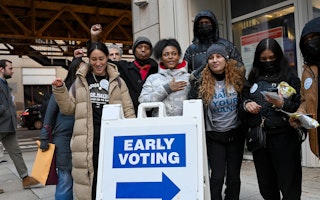NEW YORK—Developing policies to better protect refugee communities. Working to end exploitative rates for inmate phone services. Pushing to boost the civic participation of people of color and women in local communities. Fortifying the ability of state and local governments to enforce civil rights laws. Strengthening protections for the growing number of Americans in independent contractor, gig economy, and temporary work arrangements.
These are the projects being undertaken by the 2018 recipients of the Open Society Foundations’ Leadership in Government Fellowship, an initiative supporting seasoned public servants chosen from the senior ranks of federal, state, and local government who have advanced economic and social justice.
The program, now in its second year, is intended to help fellows build on their time in the public sector to develop ideas and strategies that advance the values of an open society. Fellows are also encouraged to reflect on their public service as they decide on the next steps in their careers and share insights with advocates and others about how to make policy change—at a time when public confidence in government has reached historic lows.
Grantees and staff from the Foundations also have the opportunity to learn from the fellows’ distinguished careers about how to better navigate government and leverage its resources to develop strategies that advance and defend economic and social justice in a time of rising authoritarianism in the United States.
“In this time when the political landscape is undergoing rapid and profound shifts, and our norms and institutions are under attack, it is especially important to lift up the knowledge and expertise of those who have worked effectively in government to advance change,” said Elizabeth Guernsey, a program officer with the Open Society Foundations’ U.S. Programs, who oversees the fellowship. “We are thrilled to support this class of Leadership in Government fellows and look forward to their contributions to promoting justice in the years to come.”
Jenny R. Yang, a 2018 fellow who formerly served as chair of the Equal Employment Opportunity Commission, will work on protections for the freelance, part-time, and independent workforce. “We look to our government to tackle our society’s most difficult problems, but the government cannot do it alone,” she says. “Grassroots organizing efforts play a critical role in providing voice to the needs of our most vulnerable communities. Through this fellowship, I look forward to building on my time in government to support worker organizing efforts to strengthen protections for the growing segment of workers in the contingent economy. Many of these workers, such as independent contractors and those in the on-demand economy, fall through the gaps in protections of our federal employment laws.”
Roxanne Franklin, who was director of Equity Strategy for the mayor’s office in New Orleans prior to her fellowship, looks forward to seizing the opportunity presented by this “time of increased civic engagement and activism, spurred on by the 2016 election, and the substantive dialogue and action happening on issues related to race and gender equity. The Leadership in Government Fellowship provides an exceptional opportunity to apply the insight and experience gained from serving in local government to advance social change in our communities,” she says. “I look forward to integrating this perspective while examining how cities work collaboratively with the residents they serve to foster equitable change that demonstrates shared values and intended results.”
Awards for the fellowship range from $100,000 to $133,000 to facilitate projects lasting between 12 and 18 months. Fellows will devote up to 32 hours per week to their projects.
2018 Leadership in Government Fellows
Bob Carey will analyze the policies and practices of the U.S. Refugee Admissions and Resettlement program and develop models for its future structure.
Jenny R. Yang will seek to strengthen protections for the growing number of Americans in contingent work arrangements as structural changes transform the future of work.
Jill Habig will build the capacity of state and local prosecutors to enforce civil rights, consumer protection, and environmental laws.
Mignon L. Clyburn will make the case for eliminating the predatory telephone rate regime that currently exists for inmate calling services
Roxanne V. Franklin will work to promote greater collaboration between municipal government and communities through increased civic engagement, participation, and resident leadership development.
Read more
Civic Engagement
Bolstering Women and Youth, Linchpins of Democracy

Philanthropy has historically underfunded women and youth. Open Society’s new $50 million investment in their engagement addresses that imbalance—and builds on recent surges in civic engagement crucial to the future of American democracy.
Art and Activism
Reimagining January 6th

The insurrection at the U.S. Capitol left him in a cold sweat. Creating a comic book seemed like one way to reach people not obsessively following the news and spark activism to help defend a multicultural democracy.
Workers' Rights
How Resilience Workers Help Combat the Climate Crisis

After climate disasters hit, migrant workers play a key role in rebuilding U.S. cities. But in this multibillion-dollar industry, they face abuse and exploitation. Now, they're fighting to have their rights recognized.